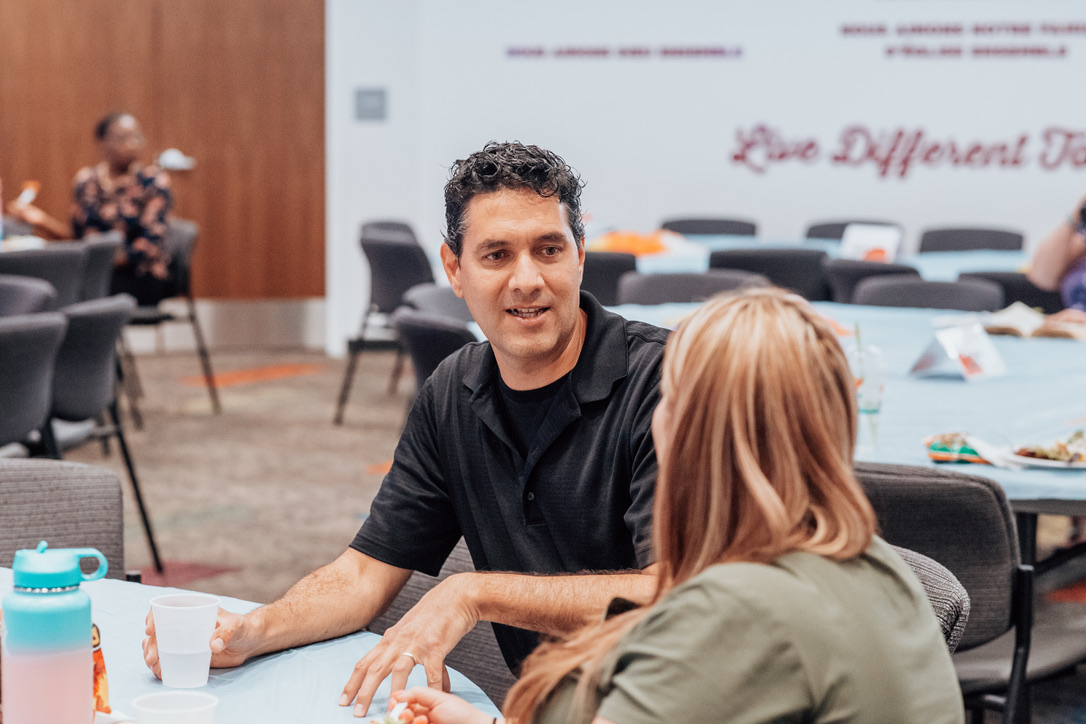

Juan Peña knows what it’s like to try and start a new life in a new country. He was 14 years old when his family immigrated to the Boston area from Colombia. He didn’t speak English and didn’t realize until they arrived in the United States that his family was poor.
“We were struggling,” he says. “As an immigrant, I woke up every morning feeling like I was four hours behind everybody and like I gotta go and catch up. I was just trying to survive every single day.”
But Peña managed to graduate from the University of Massachusetts with a degree in mechanical engineering.
Three decades later, he’s helping new immigrants to Denver find their footing. More than 39,000 migrants (as the city refers to them) have arrived in the Mile High City since the start of 2023—more than any other city per capita, according to Mayor Mike Johnston. Lack of money, federal resources, housing, and work opportunities have led to a full-blown crisis.
Which is where citizens like Peña come in.
In December 2022, Peña came face-to-face with a group of 60 Venezuelan immigrants outside of Providence Bible Church, a multicultural church he helped found in northeast Denver. (Peña has his master’s in divinity.) They weren’t dressed for winter, had no documentation, and told Peña they’d walked to Denver.
He and his wife Courtney realized they needed to help. They decided that very afternoon that they would do everything they could to help them get settled and find housing and jobs.
Peña would wake up at 5:30 a.m., drive the church bus to pick folks up at the shelters where they were staying, and take them around the city to look for jobs. If they were able to save $1,000, Peña told them he would match that number and pay the deposit for an apartment. He didn’t know if the money would be coming out of his family’s pocket at the time, but he and his wife have since launched a nonprofit, Rooted with Roofs, to help fund the ongoing work. City grants and a $25,000 infusion from Rose Community Foundation’s Newcomers Fund, which the Morgridge Family Foundation has supported, have also helped.
By the end of 2023, Peña, Courtney, and a friend had helped find housing for approximately 300 people, including that original group of 60. They have also assisted many with finding work and filling out critical paperwork for work authorization.
A Humanitarian By Nature
Peña is a prolific humanitarian. In 2012, he founded Cross Purpose, a nonprofit committed to ending poverty through career and community development, which has since scaled to three locations (a fourth is coming in 2025). Each site annually serves around 200 “graduates”—individuals who’ve completed six months of personal and skill development courses, received a certificate in their chosen field, and have been hired for what Peña calls “career jobs” that pay above the minimum wage.
“As an immigrant, you don’t have an inheritance coming around,” he says. “Your career is your only safety net.”
During the pandemic, Peña started digging deeper into the question of whether Cross Purpose was really pulling people out of poverty over the long-term. He started searching for a tool that his coaches could use in conversations with their clients, or “neighbors” as Cross Purpose refers to them, to better understand their financial realities. “It’s the financial planning the wealthy people do all the time,” he says. But Peña couldn’t find one.
So he reverted to his engineering and math background, learned to code, and built one himself.
Luminate is a financial planning platform that includes benefits and taxes, and shows individuals how their household income will be impacted by decisions like taking a pay raise or accepting a promotion. The “cliff effect” (also known as the “benefits cliff”) is a well-known phenomenon: As individuals earn more money, they lose public benefits like TANF (Temporary Assistance for Needy Families), or housing subsidies. That can nullify their improved earnings, leaving them worse off than if they’d declined the raise—a reality that traps individuals in a cycle of poverty and disincentivizes job growth.
Peña started testing a beta version of Luminate with Cross Purpose clients in the fall of 2021, but soon realized that the tool could help millions more people across the country. With help from MFF and others, and his new parent company TorchTech, he piloted an improved version with eight nonprofits in summer 2023. Luminate is now being rolled out across Colorado for use by nonprofits, case managers, career coaches, and others. They pay to use the service, and those funds benefit Cross Purpose’s vocational work.
The goal is to have the calculator operating in five other states by the end of 2024.
But the bigger, close-the-heart goal for Peña is for individuals to be able to see their financial situations clearly, make smart decisions, and have support—whether it’s from a nonprofit or a case manager—as they work toward self-sufficiency.
“These cliffs were like land mines that nobody knows where they’re at,” Peña says. “Our neighbors deserve to know the financial implications of decisions they make around their incomes.”